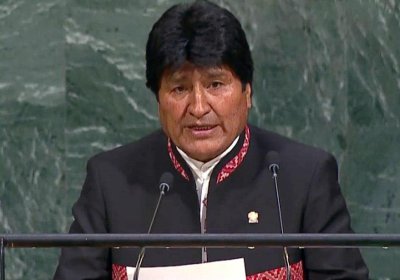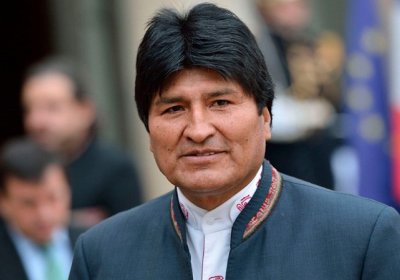Bolivian President Evo Morales addressed the United Nations General Assembly on February 1 for the opening ceremony of the International Year of Indigenous Languages, where he warned about the accelerated destruction such languages are suffering.
Bolivia
Bolivian President Evo Morales said “the US is the real threat to humankind” on September 7 in response to US Senator Marco Rubio's talk of using the US Armed Forces against the Venezuelan government. Rubio had said Venezuela “has become a threat for the region and even for the United States”.
Voices from across South America have denounced Israel’s massacre of more than 50 Palestinians on May 14 and its ongoing repression of protesters participating in the Great March of Return that began in Gaza on March 30.
They have also condemned the United States’ decision to move its Embassy to Jerusalem and pledged support to the boycott, divestment and sanctions (BDS) campaign against Israeli apartheid.
Latin American leaders have strongly defended the world’s most impoverished migrants after US President Donald Trump reportedly referred to certain developing nations as “shithole countries”.
Bolivian President Evo Morales expressed his indignation on Twitter: “To insult African countries, El Salvador and Haiti, Trump insults the world and demonstrates his opinions and politics are contaminated by capitalist racism, fascism, arrogance, and ignorance.
“History has shown that those who offend like this end up eating their words.”
October 9 marks the 50th anniversary of the CIA-ordered assassination of Che Guevara.
In light of a recent upsurge in denunciations of Che and the Cuban Revolution, it is important to separate fact from fiction.
Bolivia’s President Evo Morales used his September 19 speech to the United Nations General Assembly to condemn terrorism, abusive market practices and wars in countries such as Syria, Iraq, Libya as well as the humanitarian crisis in Yemen.
In his address to the 72nd UN General Assembly in New York, Morales also sent his solidarity to the people of Mexico after the 7.1 earthquake and Caribbean nations devastated by hurricanes Irma and Maria.
Plebeian Power: Collective Action & Indigenous, Working-Class & Popular Identities in Bolivia
By Alvaro Garcia Linera
Haymarket Books, 2014
345 pp, US$28.00
Alvaro Garcia Linera, twice-elected vice-president of Bolivia, is the continent’s most prominent theoretician-politician to place 21st century Latin American left thought in a Marxist framework.
Bolivian President Evo Morales has rejected the United States economic blockade imposed on Cuba, as well as President Donald Trump’s decision to backtrack on the normalisation of diplomatic relations with Havana.
In a public letter sent to his Cuban counterpart Raul Castro, Morales repeated his nation’s “unconditional support and solidarity” with the Cuban Revolution and the “most heroic people of the continent”.
Convened by the Bolivian government and social movements, a global peoples’ summit on migrant and refugee rights attracted more than 4000 pro-migrant and refugee rights activists from 43 countries. Dubbed the World People’s Conference “For a World without Borders Towards Universal Citizenship”, it was held in the town of Tiquipaya, on June 20-21.
Bolivian President Evo Morales offered to “free” Organization of American States, OAS, Secretary General Luis Almagro from the “North American empire” on June 24
“I offer to free brother Luis Almagro from submission to the North American empire,” Morales said in a tweet. “All for the dignity and sovereignty of our peoples.”
The message came only hours after Almargo declared that he would resign “for freedom in Venezuela.”
At the closing of the World Peoples' Conference on June 21 in Tiquipaya, Bolivia, social movements called for a “world without walls,” while Bolivian President Evo Morales urged social movements to adopt the progressive proposals of the gathering's final declaration, which dubbed the migration crisis as just one symptom of neoliberal globalisation.
The Bolivian government has proposed a bill that would allow workers to take over the private companies they work at if they go bankrupt, and convert them into “social companies” to stimulate production and address unemployment, Pagina Siete reported on May 16.
The government justified the measure as part of the state's duty to protect labour rights and generate job opportunities while improving the productive apparatus of the country.
- Previous page
- Page 4
- Next page











